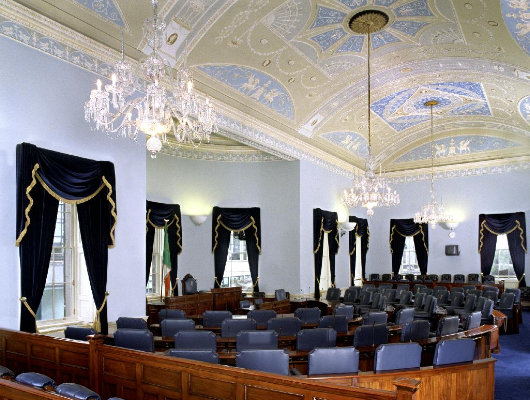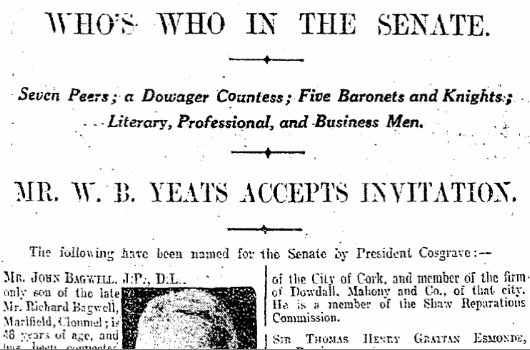
About Andrew Cusack
 Writer, web designer, etc.; born in New York; educated in Argentina, Scotland, and South Africa; now based in London.
Writer, web designer, etc.; born in New York; educated in Argentina, Scotland, and South Africa; now based in London. read more
News
Blogs
Reviews & Periodicals
Arts & Design
World
France
Mitteleuropa
Knickerbockers
Argentina
The Levant
Africa
Cape of Good Hope
Netherlands
Scandinavia
Québec
India
Muscovy
Germany
Academica
Seanad Éireann

Ireland’s senate is a curious creature. Its first members were co-opted & appointed and these included seven peers, a dowager countess, and five baronets and knights, twenty-three Protestants, and a Jew. Among this cast of characters were W. B. Yeats, General Sir Bryan Mahon, and the physician-poet-author Oliver St. John Gogarty. In 1937, however, the Seanad Éireann took its current form, and since the abolition of the Bavarian upper house in 1999, the Seanad is (so far as my research can discover) the last corporately organised parliamentary body in Europe.
There are sixty members of the Irish senate, who are chosen by a variety of means. Eleven are appointed by the serving Taoiseach (prime minister) to lessen the chances of a government that commands a majority in the Dáil (lower house) from not being able to pass legislation in the Seanad, and originally to represent smaller communities (the Anglo-Irish, etc.) who would be unrepresented in a purely democratic, winner-takes-all election. Three are elected by the graduates of the University of Dublin (better known as Trinity College), and a further three by the graduates of the National University of Ireland (with its constituent colleges/universities at Dublin, Cork, Galway, and Maynooth).
The Dublin University parliamentary constituency has been in existence since 1603. Until 1800 it was in the Irish House of Commons, then from 1801 to 1922 it was in the British House of Commons. From 1922 to 1937 it was in the Dáil Éireann, Ireland’s lower house, but was transferred to the Seanad in 1938. The constituency has often elected persons of great historical interest, such as Sir Edward Carson, Owen Sheehy-Skeffington, and Conor Cruise O’Brien.
The NUI constituency was only just introduced in 1918 with the reform of university constituencies in the British House of Commons. Like Dublin University, its representatives sat in the House of Commons, then the Dáil Éireann, and finally the Seanad Éireann.
In addition to the taoiseach’s appointments and the university representatives, forty-three senators are elected by a special electorate of TDs (Teachtaí Dála, members of the lower house), senators, and local councillors. The nominees for these forty-three seats are selected by five vocational panels: the Administrative Panel, representing government workers, social services, and the voluntary & non-profit sectors; the Agricultural Panel, representing farming and fishing; the Cultural & Educational Panel, representing arts, literature, culture, education, and the Irish language; the Industrial & Commercial Panel, representing industry and commerce, as well as engineering and architecture; and the Labour Panel, representing workers both organised into unions and independent from unions.

The idea was that the Dáil, the lower house, would represent the Irish people by being directly elected by the population, while the Seanad would represent the various distinct sectors of the population to give a particular voice to these constituencies. In practise, senators are often failed candidates for the Dáil whom the ruling party wants to include in the government. Intellectuals are always beating up on the senate, variously claiming that it should be made larger, made smaller, have its power cut, have its power increased, be directly elected, be abolished, or any variety of the above you might fancy. To democratise the Seanad would do nothing but introduce yet another house of professional politicians with entire careers funded by the hard-working Irish taxpayer.
If the Seanad hasn’t hurt anyone, why fiddle with it? It might be ineffective as an upper house, but Ireland hasn’t suffered hugely for it. It’s an interesting little thing, and those who want to either make it go away or make it more democratic are the bores of the world — the “monotony monitors” as my old Latin teacher called them — who travel the four corners of the globe seeking out remaining pockets of individuality and interesting-ness to be standardised into boredom or else abolished.
Search
Instagram: @andcusack
Click here for my Instagram photos.Most Recent Posts
- Waarburg October 2, 2024
- A Prize for the General September 23, 2024
- Articles of Note: 17 September 2024 September 17, 2024
- Equality September 16, 2024
- Rough Notes of Kinderhook September 13, 2024
Most Recent Comments
Book Wishlist
Monthly Archives
Categories



Intellectuals are always beating up on the senate, variously claiming that it should be made larger, made smaller, have its power cut, have its power increased, be directly elected, be abolished, or any variety of the above you might fancy.
So in short, it’s the same sad story as with the Bavarian Senate. Of course, in Bavaria, no intellectuals were involved, instead this charming institution (who could resisit a body whose President was for more than a decade called Hippolyt Theodor Wilhelm Georg Benedikt Johannes Maria Freiherr Poschinger von Frauenau; also, there was a representation of the Church, e.g. protonotary apostolic Josef Lederer was a member at its dissolution) was scrificed on the altar of “slimming down the state” and “reducing beaurocracy”, with the politicians mindlessly echoing the dreary soulless argot of business consultants.
Interestingly, not only can graduates vote in the DU constituency election: Trinity College undergraduates elected to scholarship are also entitled to vote.
Superb post. One comment: the Irish Upper House is somewhat plagued by career politicians, albeit former members of the Lower House who have proved unable to secure re-election and fall back on the nomination of the Taoiseach for the Seanad. Were it comprised merely of distinguished personages – and there are a few – it would indeed merit the kind comments you accord it. One improvement that could be made without violence to its corporatism would be to allocate the Christian denomations some seats, which would incidentally leaven the mix of secularists, who predominate in disproportionate number to their following in the country. When you are next in Dublin I trust you will make contact and I will show you the chamber personally.
RW
The “Senate of Southern Ireland” — which I think only ever met once or twice — included two representatives each from the Catholic Church and the Church of Ireland.
It would also be nice if the Irish peers could elect a senator (or two or three) from amongst their ranks.
Ronan Mullen, although elected to the Senate last year for the NUI constituency, is as good a representative of the Catholic Church as you will find in politics today.
In point of fact, NUI MPs never sat in the Commons. They attended the Mansion House for the first Dáil instead.
The Slovenian upper house, the National Council, also has corporatist representation.